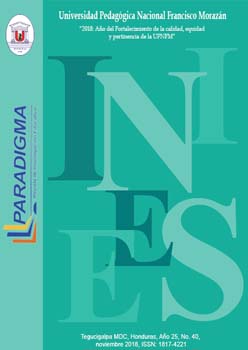¿How much influence does the international agenda have over the Central American educational systems? A theoretical framework
DOI:
https://doi.org/10.5377/paradigma.v25i40.7532Abstract
This essay proposes a theoretical framework to analyze the international input on Central American educational reform processes in the early 90s, in light of the political and cultural background in the region. The framework is based on a dialogue between the critical international and cultural perspectives of political economy applied in studies of educational sociology, in order to understand the influence that international agencies and their respective educational agendas have on educational reform processes in each national historical setting. The essay sustains that this theoretical analysis helps to understand how globalization, mainly understood as global capitalism, interacts with the national educational systems as a part of the nation state; and also, the power relations between different national agents, and their capacity to produce, thru educational reform process, an ideological hegemonic vision of society and ideal citizenship according to a country’s ideas of class, ethnicity, gender and religion.
Keywords
Educational reforms in Central America, educational sociology, political economy, globalization, ideological hegemony
Downloads
866
Downloads
Published
How to Cite
Issue
Section
License
Transfer of Copyright
- The author, when sending the work, states that it is his will to give the Universidad Pedagógica Nacional Francisco Morazán the patrimonial rights that correspond to him as the author of his work.
- The rights here assigned include all economic rights (Reproduction, transformation, public communication and distribution) and are given without limitation in terms of territory; This Assignment is given for the entire duration term established in the current legislation in Honduras.
- The cession of the aforementioned rights does not imply the cession of moral rights over it, because in accordance with the provisions of the Copyright and Related Rights Law, Chapter II, of the Moral Rights, Article 34, Article 25 , these rights are inalienable, imprescriptible, indefeasible and inalienable.
- The research work or document must be original and have been done without violating or usurping rights of third parties, therefore, the work is exclusively authored and owns the same.
- In the case of any claim or action by a third party, as to copyright on the work in question, the author must assume full responsibility for the rights assigned.
- Upon completion of the Rights Assignment Form, the author states that the work has not been published in another way, that the rights on the work have not been assigned and that no encumbrance or limitation on their use or use is imposed on them.





